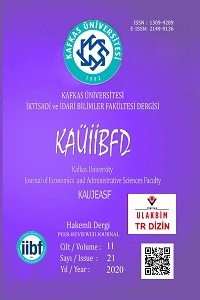Öz
Historical data
show that income inequality has been steadily increasing since the 1980s. In
fact, income inequality has reached the level of the early 20th century in many
countries, especially in the USA. The main reason for this trend is the
neo-liberal understanding. With neo-liberal policies, the economic sphere has
distanced itself from the public/political sphere and intervention, and has
gained so-called autonomy. On the other hand, the increase in income
inequality, which is universal, appears in different forms and levels in the
USA and Europe. The basis of this differentiation lies in the role of the state
in economic and social life. Despite all contradictory discourses, facts and
statistics indicate that the state is still an important tool in reducing
income inequality. When the income inequality of the European countries and the
USA are compared, the importance and necessity of the social state becomes
concrete.
Anahtar Kelimeler
Kaynakça
- Alvaredo, F., L. Chancel, T.Piketty, E. Saez, G. Zuckman (20218). World Inequality Report.2018.
- Atkinson, A. B. (2015). Inequality: what can be done?. Massachusetts: Harvard University Press.
- Bartels, L. (2008). The New Gilded Age, In Unequal Democracy: The Political Economy of the New Gilded Age (pp. 1-28). Princeton University Press. Retrieved from http://www.jstor.org/stable/j.ctt7t9ks.4
- Bauman, Z. (2013). Does the richness of the fewbenefit us all?. Maldenand Cambridge: Polity.
- Bauman, Z. (2005). Work, consumerism and the new poor. Berkshire: Open University Press.
- Bucheli, M., Rossi, M. & Amábile, F. J Econ Inequal (2019). https://doi.org/10.1007/s10888-019-09416-8
- Congressional Budget Office (2018). The distribution of household ıncome. 2015 (https://www.cbo.gov/publication/54646)
- Esping-Andersen, G. (1990). The three worlds of welfare capitalism. Cambridge: Polity.
- Faulkner, N. (2013). A Marxist history of the world: from neanderthals to neoliberals. London: Pluto Press.
- Freeman, R. B. (1996). The minimum wage as a redistributive tool. The Economic Journal, Vol. 106, No. 436 (May, 1996), pp. 639-649.
- George, V.and Wilding, P. (2002). Globalization and human welfareNew York: Palgrave.
- Giddens A.,(2009). Sociology.6th edition, Cambridge: Polity Press.
- Gramsci, A. (1995). Further Selections from the Prison Notebooks. Ed. Boothman, USA: University of Minnesota Press.
- Greenstone, M. and Looney, A. (2012). Just how progressive is us tax code?.(https://www.brookings.edu/blog/up-front/2012/04/13/just-how-progressive-is-the-u-s-tax-code/)
- Greig, A., Hulme, D., &Tuner, M. (2007). Challenging global ınequality: development theory and practice in the 21st century.London: Palgrave Macmillan.
- Hardt, M. & Negri, N. (2004). Multitude: war and democracy in the age of empire, New York: Penguin Press.
- Held, D. (2004). The global covenant: the social democratic alternative to the washington consensus. Cambridge: Polity.
- Held, D.,&Kaya, A. (ed.) (2007). Global ınequality: patterns and explanations. Cambridge: Polity.
- Heywood, A. (2013). Politics, 4th Edition, New York: Palgrave.
- Milanovic, B. (2016). Global Inequality: A new approach for the age of globalization, Massachusetts: Harvard University Press.
- OECD (2008). Growing unequal? ıncome distribution and poverty in oecd countries, 2008, OECD Publishing, http://www.oecd.org/els/soc/growingunequalincomedistributionandpovertyinoecdcountries.htm).
- OECD (2011), Divided we stand: why ınequality keeps rising, OECD Publishinghttp://dx.doi.org/10.1787/9789264119536-en).
- Piketty, T.,&Saez, E., (2003). Income ınequality in the united states, 1913-1998, Quarterly Journal of Economics 118 (1), 1-39.
- Piketty, T.,&Saez, E. (2007). How progressive is the u.s. federal tax system? a historical and ınternational perspective. Journal of Economic Perspectives, Volume 21, Winter 2007, pp. 3–24.
- Piketty, T., Saez, E. & Stantcheva, S. (2011). Optimal taxation of top labor ıncomes: a tale of three elasticities, NBER Working Paper, No.17616.
- Piketty, T. (2014). capital in the twenty-first century,Massachusetts: Harvard University Press.
- Price, M..& Sommeiller, E., (2018). The new gilded age: ıncome inequality in the u.s. by state, metropolitan area, and county. Economic Policy Institute, https://www.epi.org/files/pdf/147963.pdf
- Solt, F. (2019). Measuring ıncome ınequality across countries and over time: the standardized world ıncome ınequality database. SWIID Version 8.1
- Stiglitz, J. E., (2012). The price of ınequality: how today's divided society endangers our future, New York: W.W. Norton&Company.
- Stiglitz, J. E. (2019a). The economy we need, https://www.project-syndicate.org/onpoint/the-economy-we-need-by-joseph-e-stiglitz-2019-05?barrier=accesspaylog
- Stiglitz, J. E. (2019b). After neoliberalism, https://www.project-syndicate.org/commentary/after-neoliberalism-progressive-capitalism-by-joseph-e-stiglitz-2019-05 Wold Inequality Database (2019). https://wid.world/world/#sptinc_p99p100_z/US;FR;DE;CN;ZA;GB;WO/last/eu/k/p/yearly/s/false/5.487/30/curve/false/country
Ayrıntılar
| Birincil Dil | İngilizce |
|---|---|
| Bölüm | Makaleler |
| Yazarlar | |
| Yayımlanma Tarihi | 30 Haziran 2020 |
| Kabul Tarihi | 16 Haziran 2020 |
| Yayımlandığı Sayı | Yıl 2020 Cilt: 11 Sayı: 21 |
Cited By
ANTİK VE İMPARATORLUK ÇİN’İNDE HANEDANLIKLAR BÜROKRASİSİ: WEBERYAN BİR BAKIŞ
Toplum Ekonomi ve Yönetim Dergisi
https://doi.org/10.58702/teyd.1289988
AUTHORITY AND BUREAUCRACY FROM WEBER'S PERSPECTIVE
Mehmet Akif Ersoy Üniversitesi Sosyal Bilimler Enstitüsü Dergisi
https://doi.org/10.20875/makusobed.903546
KAÜİİBFD, Kafkas Üniversitesi İktisadi ve İdari Bilimler Fakültesi Dergi Yayıncılığı'nın kurumsal dergisidir.
KAÜİİBFD 2022 yılından itibaren Web of Science'a dahil edilerek, Clarivate ürünü olan Emerging Sources Citation Index (ESCI) uluslararası alan endeksinde taranmaya başlamıştır.
2025 Haziran ve Aralık sayısı İşletme alanı kotası dolmuştur. Bir sonraki duyuruya kadar İşletme alanındaki gönderiler değerlendirmeye alınmayacaktır. Dergimizin kapsamındaki diğer alanların makale kabul ve değerlendirmeleri devam etmektedir.


